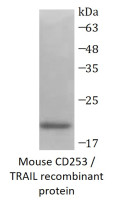ARG70402
Mouse CD253 / TRAIL recombinant protein (Active) (His-tagged, C-ter)
Mouse CD253 / TRAIL recombinant protein (Active) (His-tagged, C-ter) for SDS-PAGE
Overview
| Product Description | E. coli expressed, His-tagged (C-ter) Active Mouse CD253 / TRAIL recombinant protein |
|---|---|
| Tested Application | SDS-PAGE |
| Target Name | CD253 / TRAIL |
| Species | Mouse |
| A.A. Sequence | Pro118 - Asn291 |
| Expression System | E. coli |
| Protein Full Name | Tumor necrosis factor ligand superfamily member 10 |
| Activity | Active |
| Activity Note | Determined by its ability to induce cytotoxicity in L929 cells in the presence of actinomycin D. The ED50 for this effect is < 1 ng/mL. |
| Alternate Names | TNFSF10; TNF Superfamily Member 10; Apo-2L; TRAIL; CD253; TL2; Tumor Necrosis Factor (Ligand) Superfamily, Member 10; Tumor Necrosis Factor Ligand Superfamily Member 10; Apo-2 Ligand; TANCR; APO2L; Chemokine Tumor Necrosis Factor Ligand Superfamily Member 10; Tumor Necrosis Factor (Ligand) Family, Member 10; TNF-Related Apoptosis Inducing Ligand TRAIL; Tumor Necrosis Factor Superfamily Member 10; TNF-Related Apoptosis-Inducing Ligand; Tumor Necrosis Factor Ligand 6A; Protein TRAIL; CD253 Antigen; TNLG6A |
Properties
| Form | Powder |
|---|---|
| Purification Note | Endotoxin level is less than 0.1 EU/µg of the protein, as determined by the LAL test. |
| Purity | > 98% (by SDS-PAGE) |
| Buffer | PBS (pH 7.4) |
| Reconstitution | It is recommended to reconstitute the lyophilized protein in sterile water to a concentration not less than 200 μg/mL and incubate the stock solution for at least 20 min at room temperature to make sure the protein is dissolved completely. |
| Storage Instruction | For long term, lyophilized protein should be stored at -20°C or -80°C. After reconstitution, aliquot and store at -20°C or -80°C for up to one month. Storage in frost free freezers is not recommended. Avoid repeated freeze/thaw cycles. Suggest spin the vial prior to opening. |
| Note | For laboratory research only, not for drug, diagnostic or other use. |
Bioinformation
| Gene Symbol | TNFSF10 |
|---|---|
| Gene Full Name | TNF Superfamily Member 10 |
| Background | The protein encoded by this gene is a cytokine that belongs to the tumor necrosis factor (TNF) ligand family. This protein preferentially induces apoptosis in transformed and tumor cells, but does not appear to kill normal cells although it is expressed at a significant level in most normal tissues. This protein binds to several members of TNF receptor superfamily including TNFRSF10A/TRAILR1, TNFRSF10B/TRAILR2, TNFRSF10C/TRAILR3, TNFRSF10D/TRAILR4, and possibly also to TNFRSF11B/OPG. The activity of this protein may be modulated by binding to the decoy receptors TNFRSF10C/TRAILR3, TNFRSF10D/TRAILR4, and TNFRSF11B/OPG that cannot induce apoptosis. The binding of this protein to its receptors has been shown to trigger the activation of MAPK8/JNK, caspase 8, and caspase 3. Alternatively spliced transcript variants encoding different isoforms have been found for this gene. |
| Function | Induces apoptosis. Its activity may be modulated by binding to the decoy receptors TNFRSF10C/TRAILR3, TNFRSF10D/TRAILR4 and TNFRSF11B/OPG that cannot induce apoptosis. |
| Cellular Localization | Cell membrane, Membrane, Secreted |
| PTM | Phosphoprotein |
Images (1) Click the Picture to Zoom In






